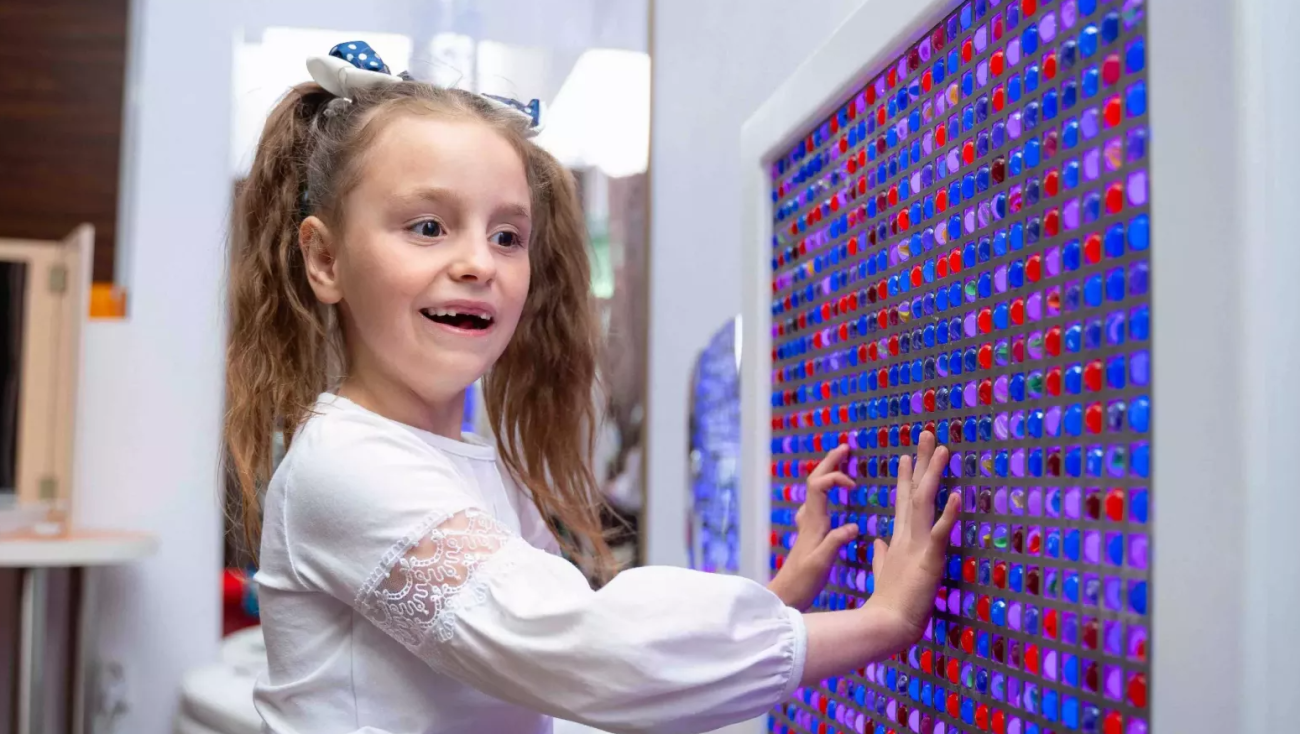Valeria started to speak thanks to therapy sessions held in the sensory room

Thanks to the Japanese Government's support, UNICEF has established sensory rooms in eight public medical institutions in the Republic of Moldova.
Ceadir Lunga, Moldova: All parents eagerly await the moment when their child starts walking and calls them mom and dad. Olga and her husband from Ceadir Lunga, parents of three, waited six years until Valeria, their first child, heard their voices and started speaking. At the age of two, Valeria was diagnosed with hearing impairments. Due to this condition, she found it challenging to make new friends, develop harmoniously, and explore the world like other children.
"She is an adorable child. She wants to be friends with all the children, but not everyone understands that she cannot hear and speak," says Olga. Despite their fears, the parents decided to trust the power of science and followed the doctors' recommendation to undergo cochlear implant surgery. "Like any parent, we were scared and initially refused the surgery. Three months later, we changed our minds and went through with it. It was very difficult for us to make this decision. We were afraid of causing more harm, but after doing it, we recommend parents take the risk rather than stay in the same place," says Olga.
After the surgery, expectations were high from both the parents and the doctors. Valeria began to hear but could not speak because she could not perceive sounds. The miracle happened after the first visits to the sensory room, established by UNICEF with the support of the Government of Japan, at the Recovery Centre for Children 'Ceadir Lunga'. Valeria is the first child, who started to benefit from the sensory room services. Here, children have a unique environment with various materials that help them develop their sensory functions and adapt to their surroundings.
"Thanks to the activities she did in the sensory room, Valeria began to perceive her own sounds. She understood that she was speaking. Her first word was "mama". Now she says "tata" and tries to say the name of her younger sister. Before the activities in the sensory room, she tried to speak but without any result," recounts Olga emotionally.
Maria, a psychologist and speech therapist at the Recovery Centre for Children 'Ceadir Lunga', says the new addition to the centre ensures concrete results for all children with developmental and behavioral disorders. "The sensory room includes equipment that impacts all sensory functions, such as the auditory and visual systems. These ensure the child's development and the ability to analyze and correctly perceive information. We develop all sensory functions to ensure the effectiveness of subsequent therapies. We work individually with each child and achieve specific results step by step. The mission is to enable the child to analyze sensory information. If we perceive it, it will be much easier for the psychologist, psycho-pedagogue, and teacher to work with this child," says Maria.
UNICEF has established sensory rooms in eight public medical institutions in Chisinau, Orhei, Ceadir Lunga, Ungheni, Cahul, Cimislia, Strașeni. Additionally, UNICEF equipped the sensory room in the Florești District Hospital with modern materials. The primary objective of this intervention is to provide modern early childhood intervention services for children with disabilities and developmental delays in Moldova, including refugees from Ukraine. Through this programme, UNICEF aims to support around 2,000 families raising and educating children with special needs.
Moreover, starting this year, Moldova has introduced universal audiological screening, a significant advancement for the early detection of hearing deficiencies in newborns. Children like Valeria, diagnosed within the first days of birth, now have a much better chance of developing language skills and receiving effective speech therapy. This early intervention enables them to participate fully in everyday life and achieve their full potential. In alignment with global initiatives to prevent hearing impairments from an early age, UNICEF, with financial support from the Government of Japan, has provided 40 medical audiological screening devices to Moldova's healthcare system, valued at approximately MDL four million.
Maria has been with Valeria and her family since the girl was two years old and is hugely fulfilled to offer parents the hope that their daughter will someday speak like her peers. "After trying this device, the child began to perceive her voice. I didn't know how to show her voice. When she began to hear sounds, she managed to say her first words," explained Maria. Meanwhile, Valeria continues her therapy sessions. "We hope she will become as independent as possible, speak, and go to school. We have already seen beautiful results and will return for rehabilitation in this sensory room," says Olga, Valeria's mother.



